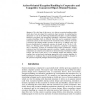Free Online Productivity Tools
i2Speak
i2Symbol
i2OCR
iTex2Img
iWeb2Print
iWeb2Shot
i2Type
iPdf2Split
iPdf2Merge
i2Bopomofo
i2Arabic
i2Style
i2Image
i2PDF
iLatex2Rtf
Sci2ools
136
click to vote
ECOOPWEXCEPTION
2000
Springer
2000
Springer
Action-Oriented Exception Handling in Cooperative and Competitive Concurrent Object-Oriented Systems
The chief aim of this survey is to discuss exception handling models which have been developed for concurrent object systems. In conducting this discussion we rely on the following fundamental principles: exception handling should be associated with structuring techniques; concurrent systems require exception handling which is different from that used in sequential systems; concurrent systems are best structured out of (nested) actions; atomicity of actions is crucial for developing complex systems. In this survey we adhere to the wellknown classification of concurrent systems, developed in the 70s by C.A.R. Hoare, J.J. Horning and B. Randell, into cooperative, competitive and disjoint ones. Competitive systems are structured using atomic transactions. Atomic actions are used for structuring cooperative systems. Complex systems in which components can compete and cooperate are structured using Coordinated Atomic actions. The focus of the survey is on outlining models and schemes which ...
Concurrent Systems | ECOOPWEXCEPTION 2000 | Exception Handling | Exception Handling Models | Software Engineering |
| Added | 02 Aug 2010 |
| Updated | 02 Aug 2010 |
| Type | Conference |
| Year | 2000 |
| Where | ECOOPWEXCEPTION |
| Authors | Alexander B. Romanovsky, Jörg Kienzle |
Comments (0)

